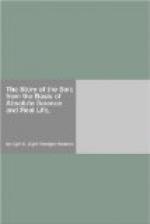“As an average of these twenty-four years, the addition of mineral plant food produced increases in crop yields above the unfertilized land as follows:
Corn increased forty-five per cent.
Oats increased thirty-two per cent.
Wheat increased forty-two per cent.
Hay increased seventy-seven per cent.
“As a general average of the four crops for the twenty-four years, the produce where mineral plant food is applied, was forty-nine per cent. above the yields of the unfertilized land, although the same rotation of crops was practiced in both cases.”
“Those are some of the absolute facts of science secured from practical application in the adoption and development of definite systems of permanent prosperous agriculture, and they should be made to serve this greatest and most important industry just as the established facts of mathematical and physical science are made to serve in engineering.”
“I am glad to know about those long-continued experiments,” said Adelaide. “They are of fascinating interest. I have been so sorry for grandma, and for papa and mamma, because of their increasing discouragement over our farm. I do hope we may profit from this fund of accumulated information which has already been secured from long years of investigation. Surely we must endeavor to avoid in America the awful conditions that already exist in the older agricultural countries, where the lands are depleted and the people are brought to greater poverty than even here in Virginia.
“But we have already reached the turn, and you have a mile to walk. How much time have you?”
“Thirty minutes yet,” said Percy. “Wait just a moment. Have you read Lincoln’s stories?”
“Many of them, yes.”
“Here is the best one he ever told; I have copied it on a card. He told it to a meeting of farmers at the close of an address in which he urged them to study the science of agriculture and to adopt better methods of farming:
“’An Eastern monarch once charged his wise men to invent him a sentence to be ever in view, and which should be true and appropriate in all times and situations. They presented him the words, “And this, too, shall pass away.” How much it expresses! How chastening in the hour of pride! How consoling in the depths of affliction! “And this, too, shall pass away.” And yet, let us hope, it is not quite true. Let us hope, rather, that by the best cultivation of the physical world beneath and around us, and the best intellectual and moral world within us, we shall secure an individual, social, and political prosperity and happiness, whose course shall be onward and upward, and which, while the earth endures, shall not pass away.’”
“I agree with you that it is his best story,” said Adelaide, as Percy finished reading and placed the card in her hand. “Now you must go or I shall insist upon taking you back to the station.”
“I shall stand here and time you till you reach the next turn,” he replied. “Then you will be in sight of Westover. One! Two! Three! Go!”




